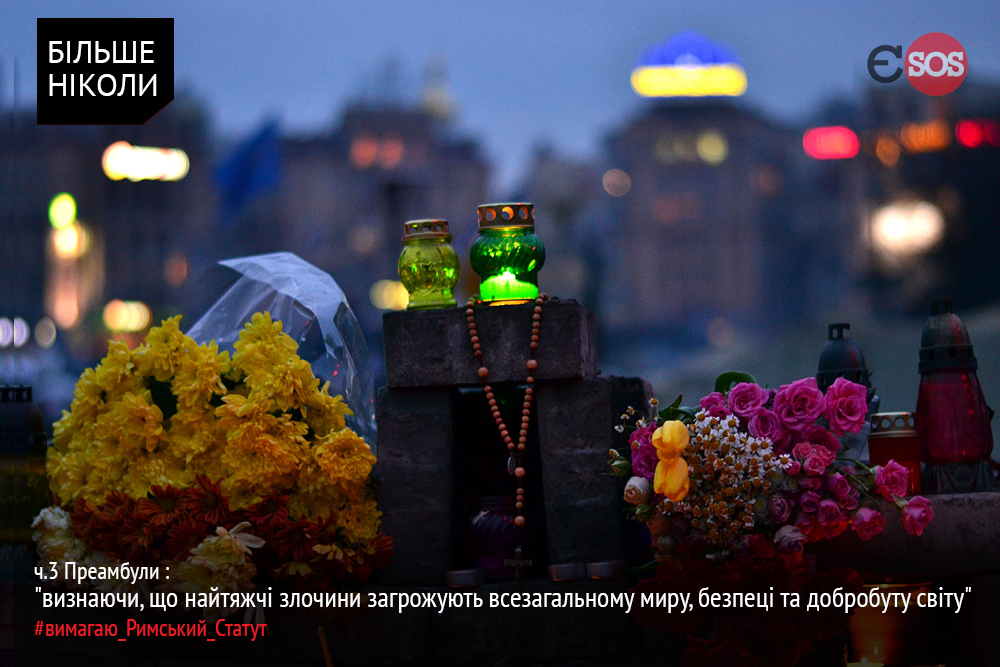Ukraine’s post-Euromaidan story should have been about reform and positive change, but has unfortunately been marred by a failure to investigate and bring those responsible for human rights violations and crimes to justice, by the ongoing conflict in the eastern part of Ukraine, by the Russian annexation of Crimea, and by ongoing abuses, corruption, and political unrest.
Failure to investigate
“There is a high expectation in Ukraine for justice for Euromaidan. Unfortunately, there is a serious lack of efficient investigation, and no strong political will to do so,” according to Tetiana Pechonchyk of Human Rights information Centre, a member of Human Rights House Kiyv.
Ukraine has had serious problems investigating the crimes committed during the protests, despite evidence such as witness accounts, photographs, videos, fragments of 23 guns recently found by Ukraine’s security service, and the identification of individuals responsible for shooting at protestors. Only a single case has been concluded in court, largely due to a failure of investigation. Indeed, it was the opinion of the International Advisory Panel, established by the Council of Europe in April 2014 to oversee the investigations, that these investigations failed to reach European standards.
Pechonchyk elaborates: “We have police officers who committed crimes during Euromaidan who are today still in their positions and who have made attempts to halt investigations against them. Others are afraid or unwilling to give evidence against their colleagues, while some of the most serious offenders have simply left Ukraine and are wanted by the State. In addition, there is a lack of reforms in the judiciary system and the prosecutor’s office, and a lack of human resources. This is coupled with the fact that ‘real’ investigations only started a year after the event. These are among the reasons why after two years there have been no effective results.”
Another flaw is that the investigations are mainly focused on the events in Kyiv, despite reports and witness accounts of crimes (murders, physical assaults, and illegal detentions) committed against activists in the regional centres of Ukraine, such as Dnipropetrovsk, Kharkiv, Khmelnytsky, Cherkasy, Sumy, and Zaporizhzhya.
Attempts by the authorities to hold officials accountable have been ineffective. For example, the 2014 the Law on Lustration – aimed at cleansing the public office of civil servants who served under removed President Viktor Yanukovych – has been criticised by the Venice Commission for having an overly broad timeframe for its application, assigning collective guilt by virtue of belonging to a category of public officials, and providing a lack of fair trial guarantees.
Russian influence
In the spring of 2014, in the aftermath of Euromaidan, Russia annexed Crimea. Under Russian occupation, Crimea has become a stage for systematic human rights abuses against minorities, particularly the Crimean Tatars. Ongoing armed conflict between pro-Russian separatists and Ukrainian government forces has increased the severity and frequency of human rights violations. The conflict has so far killed 8,000 people and forced one million people to flee their homes.
“Russia has a political responsibility in the current situation in Ukraine. Its direct support and involvement with armed groups has led to a deterioration in the situation. This has directly contributed to human rights abuses in Eastern Ukraine and indirectly weakened the Ukrainian government’s ability to implement reforms in the country,” says Human rights House Network’s Head of Advocacy, Florian Irminger.
In March 2015, the UN Human Rights Mission in Ukraine and the UN High Commissioner for Human Rights documented violence in Ukraine by armed groups supported by the Russian Federation.
“The international community needs to address the responsibility of those supporting armed forces in Ukraine. The Kremlin is taking measures to suppress this responsibility. For example, it has attempted to silence opposition to intervention in Ukraine back at home in Russia, designating the Russian NGO Soldiers’ Mothers of Saint Petersburg as a ‘foreign agent’ on 29 August 2014, following the NGO denouncing the deaths of Russian soldiers in Ukraine,” Irminger continued.
The important role of civil society
Ukrainian society still struggles with a high degree of corruption, being ranked the most corrupt country in Europe by Transparency International, and it suffers from significant political unrest. The Ukrainian Minister of Finance recently resigned and the government barely survived a motion of no confidence.
Irminger stressed the importance of civil society in Ukraine: “Civil society has a pivotal role to play in addressing these challenges. The Ukrainian authorities and the international community must acknowledge and strengthen the work carried out by human rights NGOs in Ukraine. During Euromaidan, Ukrainian human rights defenders supported peaceful demonstrators and documented human rights violations, including the widespread use of torture and killings by law enforcement agencies. Today, civil society is at the forefront of the push for democratic reforms in Ukraine, and is active in documenting large-scale human rights violations in Eastern Ukraine and Crimea. Leaders in all sectors of society should support publicly the important and legitimate role of these human rights defenders, and the Ukrainian authorities should engage with civil society to help improve reform processes and increase accountability for human rights violations.”
Euromaidan
In November 2013, the Euromaidan protests began in favour of closer ties with Europe. As the government began to respond violently to the protests, their focus shifted to also include the use of excessive force, government corruption, and human rights violations.
The violence peaked between 18 and 20 February 2014, a period in which police employed tear gas and stun grenades, and armed security forces, including snipers, reportedly began firing on protestors. This violent period resulted in the deaths of 114 people, including 17 police officers. Euromaidan participants also experienced torture, enforced disappearances, beatings, and falsified criminal cases at the hands of the authorities.





